|
Books Should Be Free Loyal Books Free Public Domain Audiobooks & eBook Downloads |
|
|
Books Should Be Free Loyal Books Free Public Domain Audiobooks & eBook Downloads |
|
Non-fiction |
|---|
|
Book type:
Sort by:
View by:
|
By: Francis Pharcellus Church (1839-1906) | |
|---|---|
 Yes, Virginia, There Is A Santa Claus
Yes, Virginia, There Is A Santa Claus
“Is There A Santa Claus?” was the headline that appeared over an editorial in the September 21, 1897 edition of the New York Sun. The editorial, which included the response of “Yes, Virginia, There is a Santa Claus,” has become an indelible part of popular Christmas lore in the United States. | |
By: Hilaire Belloc (1870-1953) | |
|---|---|
 The French Revolution
The French Revolution
“It is, for that matter, self-evident that if one community decides in one fashion, another, also sovereign, in the opposite fashion, both cannot be right. Reasoning men have also protested, and justly, against the conception that what a majority in numbers, or even (what is more compelling still) a unanimity of decision in a community may order, may not only be wrong but may be something which that community has no authority to order since, though it possesses a civil and temporal authority, it acts against that ultimate authority which is its own consciousness of right... | |
 Europe and the Faith
Europe and the Faith
The Catholic brings to history (when I say "history" in these pages I mean the history of Christendom) self-knowledge. As a man in the confessional accuses himself of what he knows to be true and what other people cannot judge, so a Catholic, talking of the united European civilization, when he blames it, blames it for motives and for acts which are his own. He himself could have done those things in person. He is not relatively right in his blame, he is absolutely right. As a man can testify to his own motive so can the Catholic testify to unjust, irrelevant, or ignorant conceptions of the European story; for he knows why and how it proceeded... | |
 First and Last
First and Last
“When a man weighs anchor in a little ship or a large one he does a jolly thing! He cuts himself off and he starts for freedom and for the chance of things. He pulls the jib a-weather, he leans to her slowly pulling round, he sees the wind getting into the mainsail, and he feels that she feels the helm. He has her on a slant of the wind, and he makes out between the harbour piers.” (quotation from Hilaire Belloc) | |
 On Something
On Something
“Now that story is a symbol, and tells the truth. We see some one thing in this world, and suddenly it becomes particular and sacramental; a woman and a child, a man at evening, a troop of soldiers; we hear notes of music, we smell the smell that went with a passed time, or we discover after the long night a shaft of light upon the tops of the hills at morning: there is a resurrection, and we are refreshed and renewed.” – Hilaire Belloc | |
 On Nothing & Kindred Subjects
On Nothing & Kindred Subjects
“I knew a man once, Maurice, who was at Oxford for three years, and after that went down with no degree. At College, while his friends were seeking for Truth in funny brown German Philosophies, Sham Religions, stinking bottles and identical equations, he was lying on his back in Eynsham meadows thinking of Nothing, and got the Truth by this parallel road of his much more quickly than did they by theirs; for the asses are still seeking, mildly disputing, and, in a cultivated manner, following the... | |
 This, That, and the Other
This, That, and the Other
“When Fame comes upon a man well before death then must he most particularly beware of it, for is it then most dangerous. Neither must he, having achieved it, relax effort nor (a much greater peril) think he has done his work because some Fame now attaches thereto.” -- Hilaire Belloc | |
 On Anything
On Anything
"Long before I knew that the speech of men was misused by them and that they lied in the hearing of the gods perpetually in those early days through which all men have passed, during which one believes what one is told, an old and crusty woman of great wealth, to whom I was describing what I intended to do with life (which in those days seemed to me of infinite duration), said to me, ( You are building castles in Spain.' I was too much in awe of this woman not on account of the wealth, but on account... | |
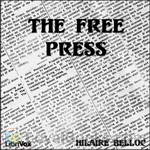 The Free Press
The Free Press
I propose to discuss in what follows the evil of the great modern Capitalist Press, its function in vitiating and misinforming opinion and in putting power into ignoble hands; its correction by the formation of small independent organs, and the probably increasing effect of these last. (Introduction by Hilaire Belloc) | |
By: Ida Laura Pfeiffer | |
|---|---|
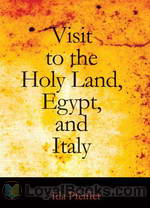 A Visit to the Holy Land, Egypt, and Italy
A Visit to the Holy Land, Egypt, and Italy
Ida Pfeiffer travelled alone in an era when women didn’t travel. She went first on a pilgrimage to the Holy Land, then went on to Egypt and Italy. Understanding the difficulties a woman would face travelling alone and on a budget, she made a will before she left. Go she did, however; and upon her return she wrote this book. She used the proceeds to finance her next trip – six months in Iceland. | |
By: Robert Green Ingersoll (1833-1899) | |
|---|---|
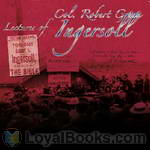 Lectures of Col. R. G. Ingersoll
Lectures of Col. R. G. Ingersoll
Colonel Robert Green Ingersoll (1833–1899) was a Civil War veteran, American political leader and orator during the Golden Age of Freethought, noted for his defense of atheism. This book is the first of two volumes collecting Ingersoll’s speeches. | |
By: Justus Liebig (1803-1873) | |
|---|---|
 Familiar Letters on Chemistry
Familiar Letters on Chemistry
Justus von Liebig (1803-1873) was a German chemist who made major contributions to agricultural and biological chemistry and is known for his discovery of nitrogen as an essential plant nutrient. These letters “were written for the especial purpose of exciting the attention of governments, and an enlightened public, to the necessity of establishing Schools of Chemistry, and of promoting by every means, the study of a science so intimately connected with the arts, pursuits, and social well-being of modern civilised nations.” | |
By: US Army Corps of Engineers, Manhattan District | |
|---|---|
 The Atomic Bombings of Hiroshima & Nagasaki
The Atomic Bombings of Hiroshima & Nagasaki
This is the official report, published nearly 11 months after the first and only atomic bombings in history (to date), of a group of military physicians and engineers who accompanied the initial contingent of U.S. soldiers into the destroyed cities of Hiroshima and Nagasaki. The report presents a clinical description of the devastation, loss of life and continued suffering of the survivors that resulted from the world’s first and only atomic bombings. The appendix is an eyewitness account, contrasting... | |
By: Constance Johnson | |
|---|---|
 When Mother Lets Us Cook
When Mother Lets Us Cook
A book of simple receipts for little folk with important cooking rules in rhyme together with handy lists of the materials and utensils needed for the preparation of each dish. | |
By: Varous | |
|---|---|
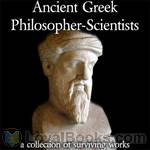 Ancient Greek Philosopher-Scientists
Ancient Greek Philosopher-Scientists
The Pre-Socratic Greek philosophers, that is, the philosopher-scientists who lived before or contemporaneously to Socrates, were the first men in the Western world to establish a line of inquiry regarding the natural phenomena that rejected the traditional religious explanations and searched for rational explanations. Even though they do not form a school of thought, they can be considered the fathers of philosophy and many other sciences as we have them now. None of their works is extant, so, in this collection, we present the textual fragments, when existing, of ten Pre-Socratic philosopher-scientists, and quotations and testimonials about them left by later authors... | |
By: Rufus Estes (b. 1857) | |
|---|---|
 Good Things to Eat as Suggested by Rufus
Good Things to Eat as Suggested by Rufus
Rufus Estes was born a slave in 1857 in Tennessee, and experienced first hand the turmoil of the Civil War. He began working in a Nashville restaurant at the age of 16, and in 1883 took up employment as a Pullman cook. In 1897, he was hired as principal chef for the private railway car of U.S. Steel magnates (the fin-de-siecle equivalent of today’s Lear Jets for corporate travel). There he served succulent fare for the rich and famous at the turn of the 20th century. | |
By: Richard Jefferies (1848-1887) | |
|---|---|
 The Gamekeeper at Home
The Gamekeeper at Home
Richard Jefferies (1848 – 1887) was born and spent his childhood on a farm at Coate,Wiltshire. He joined the ‘Wiltshire and Gloucestershire Standard’ in 1868 and also started to write articles and pamphlets on various agricultural issues and local history topics. He is best known for his depiction of English rural life in essays, books of natural history, and novels. This classic of English nature writing gives an idea of the life of a gamekeeper in southern England in the second half of the nineteenth century. | |
By: Giacomo Casanova (1725-1798) | |
|---|---|
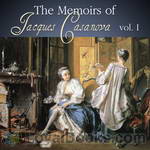 The Memoirs of Jacques Casanova
The Memoirs of Jacques Casanova
This is the first of five volumes. – Giacomo Casanova (1725 in Venice – 1798 in Dux, Bohemia, now Duchcov, Czech Republic) was a famous Venetian adventurer, writer, and womanizer. He used charm, guile, threats, intimidation, and aggression, when necessary, to conquer women, sometimes leaving behind children or debt. In his autobiography Histoire de ma vie (Story of My Life), regarded as one of the most authentic sources of the customs and norms of European social life during the 18th century, he mentions 122 women with whom he had sex... | |
By: United States Supreme Court | |
|---|---|
 Civil Rights and Equal Protection Cases 1856-1948
Civil Rights and Equal Protection Cases 1856-1948
Landmark United States Supreme Court decisions focusing on civil rights and equal protection between 1856 and 1948. | |
 Civil Rights and Equal Protection Cases 1950-1960
Civil Rights and Equal Protection Cases 1950-1960
Landmark United States Supreme Court decisions focusing on civil rights and equal protection between 1950 and 1960. | |
By: Elizabeth Davis Bancroft (1803-1886) | |
|---|---|
 Letters from England, 1846-1849
Letters from England, 1846-1849
Elizabeth Bancroft went to England with her husband, historian George Bancroft, for three of the most dynamicy years in European hstory. As Ambassador to England from the United States, George moved in the highest circles. In his wife’s letters to their sons, her uncle, her brother, and Mrs. Polk (the President’s wife), we see glimpses not only of early Victorian English life, but also of Queen Victoria herself! Mrs. Bancroft speaks of dinners with Benjamin Disraeli, visits to Wordsworth, weekends in the country with Louis Napolean and Sir Robert Peel with such matter of fact aplomb that one cannot help being impressed. | |
By: Charles Hoy Fort | |
|---|---|
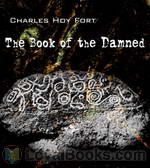 The Book of the Damned
The Book of the Damned
The Book of the Damned was the first published nonfiction work of the author Charles Fort (first edition 1919). Dealing with various types of anomalous phenomena including UFOs, strange falls of both organic and inorganic materials from the sky, odd weather patterns, the possible existence of creatures generally held to be mythological, disappearances of people under strange circumstances, and many other phenomena, the book is historically considered to be the first written in the specific field of anomalistics. – | |
By: Tacitus, Publius Cornelius (c. 56-117) | |
|---|---|
 The Works of Tacitus Vol. I, edited, translated, and with essays by Thomas Gordon
The Works of Tacitus Vol. I, edited, translated, and with essays by Thomas Gordon
The historical works of Tacitus are a history of the period from A.D. 14 to 96 in thirty volumes. Although many of the works were lost (only books 1-5 of the Histories and 1-6 and 11-16 of the Annals survive), enough remains to provide a good sense of Tacitus’s political and moral philosophy. Tacitus recognized the necessity for strong rulers but argued that more should be done to manage the succession of power and allow for the ascension of talent. He asserted that it was the dynastic ambitions of Rome’s many emperors that caused the decline of moral and political life and precluded the possibility of recruiting leaders of real ability... | |
By: Peter Abelard (1079-1142) | |
|---|---|
 The Story of My Misfortunes
The Story of My Misfortunes
Autobiographies from remote historical periods can be especially fascinating. Modes of self-presentation vary greatly across the centuries, as of course does the very concept of Self. Peter Abelard, the medieval philosopher and composer, here gives a concise but vivid survey of his notoriously calamitous life. The work is couched in the form of a letter to an afflicted friend. Abelard’s abrasively competitive, often arrogant personality emerges at once in the brief Foreword, where he informs his correspondent: “(I)n comparing your sorrows with mine, you may discover that yours are in truth nought.. and so shall you come to bear them the more easily.” | |
By: John Calvin (1509-1564) | |
|---|---|
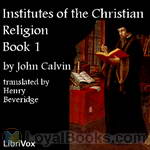 Institutes of the Christian Religion
Institutes of the Christian Religion
Institutes of the Christian Religion is John Calvin’s seminal work on Protestant systematic theology. Highly influential in the Western world and still widely read by theological students today, it was published in Latin in 1536 and in his native French in 1541, with the definitive editions appearing in 1559 (Latin) and in 1560 (French). The book was written as an introductory textbook on the Protestant faith for those with some learning already and covered a broad range of theological topics... | |
By: Christopher Morley (1890-1957) | |
|---|---|
 Mince Pie
Mince Pie
Mince Pie is a compilation of humorous sketches, poetry, and essays written by Christopher Morley. Morley sets the tone in the preface: "If one asks what excuse there can be for prolonging the existence of these trifles, my answer is that there is no excuse. But a copy on the bedside shelf may possibly pave the way to easy slumber. Only a mind "debauched by learning" (in Doctor Johnson's phrase) will scrutinize them too anxiously." | |
By: Arabella B. Buckley (1840-1929) | |
|---|---|
 Birds of the Air
Birds of the Air
Arabella Buckley had a great love of nature and wished to impart that love to children. Birds of the Air will encourage children to observe birds in their natural environment and notice the habits of each particular bird they encounter. | |
 Wild Life in Woods and Fields
Wild Life in Woods and Fields
Wild Life in Woods and Fields by Arabella B. Buckley is a collection of stories that will encourage children to become little naturalists and explore the majesty of the great outdoors. This is science taught in such a charming, delightful way that children will learn without even realizing it! | |
 By Pond and River
By Pond and River
In By Pond and River, another of Arabella Buckley’s wonderful science books for children, she explains the habitats of ponds and rivers, exposing children to the animals and plant life that are found there. | |
By: James Norman Hall | |
|---|---|
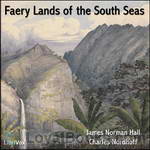 Faery Lands of the South Seas
Faery Lands of the South Seas
Returning from the horrors of World War I James Hall and Charles Nordhoff follow a dream to tour the South Pacific. They later co authored “Mutiny on the Bounty”. This is a love story. A travelogue and an adventure rolled into one. This book just went into the public domain, so enjoy an early 20th Century look at paradise. | |
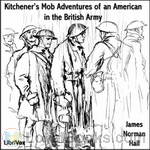 Kitchener's Mob Adventures of an American in the British Army
Kitchener's Mob Adventures of an American in the British Army
“Pvt Ryan”, “Platoon”, “A Soldier’s Home”, “Kitchener’s Mob”. These aren’t happy stories, they are about the experience of War. War at different times, and although modern warfare may be more sanitized, the adventure, the horror, the emotions don’t change. James Norman Hall has been there. He “Saw the Elephant”, and his portrayal of his WWI experience is a tribute to those ordinary people who do such extraordinary things. Those who have served will identify with at least some part if not all of this book, be it the rigors of training, the camaraderie, or possibly those memories that try as you may, you can never make go away... | |
By: John Frederick Bligh Livesay (1875-1944) | |
|---|---|
 Canada's Hundred Days: With the Canadian Corps from Amiens to Mons 1918
Canada's Hundred Days: With the Canadian Corps from Amiens to Mons 1918
This is the incredible story of the actions of the men and women of the Canadian Expeditionary Force, Canada’s contribution to the Great War 1914-1919, during the last 100 days of the First World War. After nearly 4 years of stalemate (trench warfare) the Allied Forces planned to break through the German Hindenburg Line and then push the enemy from their defensive positions. You will follow the CEF as they take Amiens (Part One), Arras (Part Two), Cambrai (Part Three) and then the pursuit of the German Forces from Valenciennes to Mons (Part Four) in Belgium, the same place where the war began on August 4, 1914, on November 11, 1918. | |